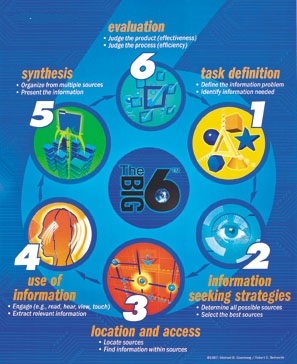Inquiry Every Day and Every Way with the Big6!
Promoting The Big6 model, approach, and programs to promote essential, lifelong information problem-solving skills thinking, learning, and teaching in schools and informal learning contexts. The Big6 is an information literacy process, a research process, and an inquiry process because it describes the way we complete assignments and solve problems in any situation.
The Big6 is a six-stage model to help anyone solve problems or make decisions by using information. Some call it information literacy, inquiry, research skills, or an information problem-solving process…but we call it the Big6!
Using the Big6, you will identify goals, seek, use, and assemble relevant, credible information, then reflect—is the final product effective and was my process efficient? The Big6 works anywhere—the classroom, workplace, or at home. Moreover, it works across content areas and aligns easily with state and national learning standards.
Read our press release announcing the new Big6.org!
WHAT IS THE BIG6?
The Big6 is a process model of how people of all ages solve an information problem. From practice and study, we found that successful information problem-solving encompasses six stages with two sub-stages under each...
WHAT IS THE SUPER3?
The Super3 contains the same basic elements as the Big6 but is written for younger students to understand…
WHY THE BIG6 AND SUPER3?
We all suffer from information overload. There’s just too much “stuff” out there, and it’s not easy to keep up. At the same time, there’s an irony—yes, we are surrounded by information, but we can never seem to find what we want, when we want it, and in a form we want it so that we can use it effectively.
One solution to the information problem—the one that seems to be most often adopted in schools (as well as in business and society in general)—is to speed things up. We try to pack in more and more content, to work faster to get more done. But, this is a losing proposition. Speeding things up can only work for so long. Instead, we need to think about helping students to work smarter, not faster. There is an alternative to speeding things up. It’s the smarter solution—one that helps students develop the skills and understandings they need to find, process, and use information effectively. This smarter solution focuses on process as well as content. Some people call this smarter solution information literacy or information skills instruction. We call it the Big6.



